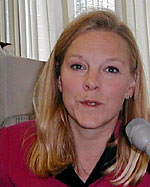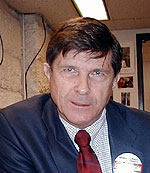By Laura McCallum
Minnesota Public Radio
October 16, 2002
When Minnesotans go to the polls, they'll choose a new state auditor. Two-term auditor Judi Dutcher isn't running for re-election. The four candidates vying to replace her are having a tough time getting anyone to pay attention to the race. It may be worth paying attention, because the auditor's office can be a stepping stone to higher positions. Two recent auditors -- Arne Carlson and Mark Dayton -- have gone on to be elected governor and U.S. senator.
| |
|
|
|
||
You'd hardly know it given all the attention on the races for U.S. Senate, Congress and governor, but there is a campaign this year for state auditor. The auditor's race has had just two debates since the primary, and barely any media coverage; not much for an office that has financial oversight responsibility for about 4,300 units of local government.
"You talk about the auditor and people's eyes glaze over," says Republican Patti Anderson Awada, the mayor of Eagan. She says she tries to get voters interested in the office by talking about the state's budget deficit, and how it will affect local governments and school districts.
Awada says voters are most interested in what happens to school funding. She says if she's elected, she wants to make it easier for people to find out where the money goes.
"I'm talking about taking and breaking down every school district's finances - apples to apples - what's spent on administrative, what's spent on busing, what number of teachers are actually in the classroom teaching... and putting those comparisons up on a Web site, sending that out to the local districts, sending that out to the local press," she says.
During the campaign, Awada has been sending out press releases criticizing her DFL opponent, Carol Johnson. Awada's first radio ad also attacks Johnson.
| |
|
|
|
||
"Pat's opponent, the current treasurer, can best be described as being dormant and ineffective, which is likely why Minnesotans voted her office out of existance," the ad says.
Minnesotans voted to eliminate the treasurer's office in 1998, the year Johnson was elected. Awada has also questioned Johnson's travel expenses, saying she and her staff spent $40,000 on junkets throughout the United States and the world. Johnson says most of her trips involved the National Association of State Treasurers. She says her office is charged with safeguarding state funds.
"We do have $40 billion under management, and I just think it would be totally irresponsible for me not to keep informed of what is going on in the investment world," she says.
Johnson has worked in the state treasurer's office for more than 15 years, and says the experience has prepared her for the job of auditor. Johnson defeated DFL endorsed candidate Greg Gray in the primary, which some political observers attributed to her statewide name recognition and common Scandinavian name.
Johnson says her name is an advantage only because people know her as the state treasurer. "Johnsons have lost," she says. "There were Johnsons that lost in the primary, so I think that probably it's an advantage but not that big an advantage that if I had not been involved and active in prior years I don't think it would have been an issue at all."
| |
|
|
|
||
The other Scandinavian name in the race, Independence Party candidate Dave Hutcheson, has never run for office before.
"I tell people I'm an unknown person running for an obscure office," he says.
Hutcheson says he's qualified to be state auditor, with a background in the military, business and education. He currently teaches management at the College of St. Benedict and St. John's University. Hutcheson says his advantage is that he's a political independent.
"In this function, other things being equal, you're better off with somebody who's not allied to the partisan things that have been going on in Minnesota politics for many years now," he says.
The fourth candidate in the race wants to talk about issues none of the others has discussed. The Green Party's Dave Berger lists his priorities as affordable housing, livable wages, education and the environment.
Berger, who teaches sociology and criminal justice at Inver Hills Community College, says there are ways the state Auditor can get involved in social justice issues. Berger says the auditor can promote the use of renewable energy, and encourage local governments to buy products from companies that pay livable wages.
"I see the big picture. I don't believe the other candidates can see the connection between the auditor's office and what goes on overseas, or the auditor's office and corporate investment. I don't think they get it. They think that they're some kind of clerk," Berger says.
Berger says he's the only one of the four candidates who has no investments in corporations the state has invested in. The state auditor serves on the state Investment Board, which oversees state pension funds. Some observers say Berger has a good chance of getting at least 5 percent of the vote, which will allow the Green Party to maintain its status as a major party in Minnesota.
More from MPR


